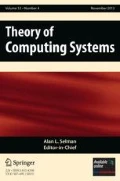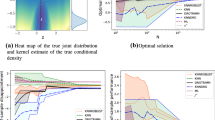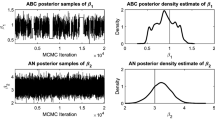Abstract
We study online multi-unit auctions in which each agent’s private type consists of the agent’s arrival and departure times, valuation function and budget. Similarly to secretary settings, the different attributes of the agents’ types are determined by an adversary, but the arrival process is random. We establish a general framework for devising truthful random sampling mechanisms for online multi-unit settings with budgeted agents. We demonstrate the applicability of our framework by applying it to different objective functions (revenue and liquid welfare), and a range of assumptions about the agents’ valuations (additive or general) when selling identical divisible items. Our main result is the design of mechanisms for additive bidders with budget constraints that extract a constant fraction of the optimal revenue (under a standard large market assumption). We also show a mechanism that extracts a constant fraction of the optimal liquid welfare for general valuations.








Similar content being viewed by others
Notes
This impossibility holds even if budgets are public.
Based on personal communication with the authors, this is essentially what is assumed for the correctness of Mechanism RMk in Section 6 in [23].
We refer to Appendix B for a description of the tie-breaking rule for this case.
While VCG is defined and analyzed for offline settings, it is shown in [23] that it can also be applied in online settings by invoking it at the time where last agent arrives, serving only the agents that haven’t departed yet. While this method does not give any revenue guarantees, it is only used to extract truthful information from agents in the sampling set.
A mechanism is IC if every agent’s expected utility is maximized when reporting her true valuation. A mechanism is IR if every agent’s expected utility is non-negative when reporting her true valuation.
Selling an entire item to each set is needed, since selling a fraction of item to a dominant agent does not give any guarantee on the liquid welfare.
This lemma is stated quite differently in [8].
References
Abrams, Z.: Revenue maximization when bidders have budgets. In: SODA, pp. 1074–1082. ACM (2006)
Awerbuch, B., Azar, Y., Meyerson, A.: Reducing truth-telling online mechanisms to online optimization. In: STOC, pp. 503–510. ACM (2003)
Azar, Y., Feldman, M., Gravin, N., Roytman, A.: Liquid price of anarchy. In: Algorithmic Game Theory - 10th International Symposium, SAGT 2017, L’aquila, Italy, September 12–14, 2017, Proceedings, pp. 3–15 (2017)
Babaioff, M., Immorlica, N., Kleinberg, R.: Matroids, secretary problems, and online mechanisms. In: SODA, pp. 434–443. SIAM (2007)
Babaioff, M., Immorlica, N., Lucier, B., Weinberg, S.M.: A simple and approximately optimal mechanism for an additive buyer. In: FOCS (2014)
Bar-Yossef, Z., Hildrum, K., Wu, F.: Incentive-compatible online auctions for digital goods. In: SODA. Society for industrial and applied mathematics, pp. 964–970 (2002)
Blum, A., Hartline, J.D.: Near-optimal online auctions. In: SODA. Society for industrial and applied mathematics, pp. 1156–1163 (2005)
Borgs, C., Chayes, J., Immorlica, N., Mahdian, M., Saberi, A.: Multi-unit auctions with budget-constrained bidders. In: EC, pp. 44–51. ACM (2005)
Caragiannis, I., Voudouris, A.A.: The efficiency of resource allocation mechanisms for budget-constrained users. In: Proceedings of the 2018 ACM Conference On Economics and Computation, Ithaca, NY, USA, June 18–22, 2018, pp. 681–698 (2018)
Chawla, S., Hartline, J.D., Malec, D.L., Sivan, B.: Multi-parameter mechanism design and sequential posted pricing. In: STOC (2010)
Chawla, S., Malec, D.L., Malekian, A.: Bayesian mechanism design for budget-constrained agents. In: EC, pp. 253–262. ACM (2011)
Chawla, S., Malec, D.L., Sivan, B.: The power of randomness in bayesian optimal mechanism design. Games Econom. Behav. 91, 297–317 (2015)
Devanur, N.R., Ha, B.Q., Hartline, J.D.: Prior-free auctions for budgeted agents. In: EC, pp. 287–304. ACM (2013)
Dobzinski, S., Lavi, R., Nisan, N.: Multi-unit auctions with budget limits. Games Econom. Behav. 74(2), 486–503 (2012)
Dobzinski, S., Leme, R.P.: Efficiency guarantees in auctions with budgets. In: ICALP, pp. 392–404. Springer (2014)
Dughmi, S., Eden, A., Feldman, M., Fiat, A., Leonardi, S.: Lottery pricing equilibria. In: Proceedings of the 2016 ACM Conference On Economics and Computation, EC ’16, Maastricht, The Netherlands, July 24-28, 2016, pp. 401–418 (2016)
Feldman, M., Fiat, A., Leonardi, S., Sankowski, P.: Revenue maximizing envy-free multi-unit auctions with budgets. In: EC, pp. 532–549. ACM (2012)
Fiat, A., Leonardi, S., Saia, J., Sankowski, P.: Single valued combinatorial auctions with budgets. In: EC, pp. 223–232. ACM (2011)
Fotakis, D., Lotidis, K., Podimata, C.: A bridge between liquid and social welfare in combinatorial auctions with submodular bidders. arXiv:1809.01803 (2018)
Friedman, E.J., Parkes, D.C.: Pricing Wifi at Starbucks: issues in online mechanism design. In: EC, pp. 240–241. ACM (2003)
Goel, G., Mirrokni, V., Leme, R.P.: Clinching auctions with online supply. In: SODA, pp. 605–619. SIAM (2013)
Goldberg, A.V., Hartline, J.D., Karlin, A.R., Saks, M., Wright, A.: Competitive auctions. Games Econom. Behav. 55(2), 242–269 (2006)
Hajiaghayi, M.T., Kleinberg, R., Parkes, D.C.: Adaptive limited-supply online auctions. In: EC, pp. 71–80. ACM (2004)
Hajiaghayi, M.T., Kleinberg, R.D., Mahdian, M., Parkes, D.C.: Online auctions with re-usable goods. In: EC, pp. 165–174. ACM (2005)
Kleinberg, R.: A multiple-choice secretary algorithm with applications to online auctions. In: SODA. Society for industrial and applied mathematics, pp. 630–631 (2005)
Lavi, R., Nisan, N.: Competitive analysis of incentive compatible on-line auctions. In: EC, pp. 233–241. ACM (2000)
Lavi, R., Nisan, N.: Online ascending auctions for gradually expiring items. In: SODA, pp. 1146–1155. SIAM (2005)
Lu, P., Xiao, T.: Improved efficiency guarantees in auctions with budgets. In: EC 15, Portland, OR, USA, June 15–19, 2015, pp. 397–413 (2015)
Lu, P., Xiao, T.: Liquid welfare maximization in auctions with multiple items. In: Algorithmic Game Theory - 10th International Symposium, SAGT 2017, L’aquila, Italy, September 12–14, 2017, Proceedings, pp. 41–52 (2017)
Parkes, D.C.: Online mechanisms (2007)
Parkes, D.C., Singh, S.P.: An Mdp-based approach to online mechanism design. In: NIPS (2003)
Author information
Authors and Affiliations
Corresponding author
Additional information
Publisher’s Note
Springer Nature remains neutral with regard to jurisdictional claims in published maps and institutional affiliations.
This article is part of the Topical Collection on Special Issue on Algorithmic Game Theory (SAGT 2017)
This work was partially supported by the European Research Council under the European Unions Seventh Framework Programme (FP7/2007-2013)/ERC grant agreement number 337122.
Appendices
Appendix A: Proofs of the Theorems from Borgs et al.
Recall that Pk(S) is the optimal price for selling k items to a set S of agents and that \(\overline {\epsilon } = \epsilon (S,k)\). Let \(r^{\infty }_{S}(p)\) denote the revenue achieved by selling an unlimited number of items (digital goods) to set S of agents at price per item p. In order to show the proofs of the lemmas in Section 3.3, we need the following lemma from [8]:
Lemma 20
[8] For anyδ > 0 andfor anyp ≥ Pk(S),the probability that\(\left |{r^{\infty }_{S_1}(p)-r^{\infty }_{S_2}(p)} \right | \leq \delta \cdot OPT(S,k)\)isat least\(1-2e^{-\delta ^2/4\overline {\epsilon }}\).
We now turn to prove the lemmas stated in Section 3.3.
Proof
of Lemma3 Since the revenue obtained from selling items at a given price per item is either bounded by the agents’ budgets or by the number of items for sale, we get that \(OPT(S,k)=\min \left \{P_k(S)\cdot k,r^{\infty }_{S}(P_k(S))\right \}\). Therefore, we get
and
When unrestricted by the number of items, we have that
Whenever \(\left |{r^{\infty }_{S_1}(P_k(S))-r^{\infty }_{S_2}(P_k(S))}\right |\leq \delta \cdot OPT(S,k)\), then
and
Combining (10) with (9) yields \(r^{\infty }_{S_1}(P_k(S))\geq \frac {1-\delta }{2}OPT(S,k)\). Similarly, combining (11) with (9) yields \(r^{\infty }_{S_2}(P_k(S))\geq \frac {1-\delta }{2}OPT(S,k)\). By (7) we clearly have \(P_k(S)\cdot \frac {k}{2}\geq OPT(S,k)/2\). Since both \(r_{S_1}=\min \left \{r^{\infty }_{S_1}(P_k(S)),P_k(S)\cdot \frac {k}{2}\right \}\) and \(r_{S_2}=\min \left \{r^{\infty }_{S_2}(P_k(S)),P_k(S)\cdot \frac {k}{2}\right \}\) we get that whenever \(\left |{r^{\infty }_{S_1}(P_k(S))-r^{\infty }_{S_2}(P_k(S))}\right |\leq \delta \cdot OPT(S,k)\) it holds that \(r_{S_1} \geq \frac {1-\delta }{2}OPT(S,k)\) and \(r_{S_2} \geq \frac {1-\delta }{2}OPT(S,k)\). The proof is now concluded by Lemma 20. □
In order to prove Lemma 4, we also need the following lemma from [8].Footnote 8
Lemma 21
[8] For allδ,p > 0 both\(r^{\infty }_{S_1}(p)\geq \min \left \{r^{\infty }_{S_2}(p)-\delta \cdot OPT(S,k),\frac {1-\delta }{2}\cdot OPT(S,k)\right \}\)and\(r^{\infty }_{S_2}(p)\geq \min \left \{r^{\infty }_{S_1}(p)-\delta \cdot OPT(S,k),\frac {1-\delta }{2}\cdot OPT(S,k)\right \}\)withprobability at least\(1-2e^{-\delta ^2/4\overline {\epsilon }}\).
Proof
Assuming \(\left |{r^{\infty }_{S_1}(P_k(S))-r^{\infty }_{S_2}(P_k(S))}\right |\leq \delta \cdot OPT(S,k)\) we get that both \(r^{\infty }_{S_2}(p)\geq r^{\infty }_{S_1}(p)-\delta \cdot OPT(S,k)\) and \(r^{\infty }_{S_1}(p)\geq r^{\infty }_{S_2}(p)-\delta \cdot OPT(S,k)\) with probability greater than \(1-2e^{-\delta ^2/4\overline {\epsilon }}\) for p ≥ Pk(S).
Recall that in the proof of Lemma 3, we showed that both \(r^{\infty }_{S_1}(P_k(S))\geq \frac {1-\delta }{2}OPT(S,k)\) and \(r^{\infty }_{S_2}(P_k(S))\geq \frac {1-\delta }{2}OPT(S,k)\) whenever \(\left |{r^{\infty }_{S_1}(P_k(S))-r^{\infty }_{S_2}(P_k(S))}\right |\leq \delta \cdot OPT(S,k)\). Since with an unlimited supply of items, \(r^{\infty }_{S}(p_1)\geq r^{\infty }_{S}(p_2)\) whenever p1 < p2 (only more agents exhaust their budget), we get that for every p ≤ Pk(S) both \(r^{\infty }_{S_1}(p)\geq \frac {1-\delta }{2}OPT(S,k)\) and \(r^{\infty }_{S_2}(p)\geq \frac {1-\delta }{2}OPT(S,k)\).
To conclude, we recall that according to Lemma 20, \(\left |{r^{\infty }_{S_1}(P_k(S))-r^{\infty }_{S_2}(P_k(S))}\right |\leq \delta \cdot OPT(S,k)\) occurs with probability at least \(1-2e^{-\delta ^2/4\overline {\epsilon }}\). □
We now proceed to show the proof of Lemma 4.
Proof
of Lemma4 We first assume that \(\left |{r^{\infty }_{S_1}(P_k(S))-r^{\infty }_{S_2}(P_k(S))}\right |\leq \delta \cdot OPT(S,k)\). By definition, \(OPT(S_1,k/2)\geq r_{S_1}\). In this case, as shown in the proof of Lemma 3, \(OPT(S_1,k/2)\geq \frac {1-\delta }{2}OPT(S,k)\). Therefore, it is clear that both
and
Combining the last inequality with Lemma 21, we get that
Since in Offline-Rev-Maximization either the agents of S2 exhaust their budget, or k/2 items are sold, we get that the revenue of mechanism Offline-Rev-Maximization from agents in set S2 is not smaller than: \(\min \left \{r^{\infty }_{S_2}(P_{k/2}(S_1)),P_{k/2}(S_1)\cdot \frac {k}{2}\right \}\geq \frac {1-3\delta }{2}OPT(S,k)\). To conclude, we note that according to Lemma 20, \(\left |{r^{\infty }_{S_1}(P_k(S))-r^{\infty }_{S_2}(P_k(S))}\right |\leq \delta \cdot OPT(S,k)\) occurs with probability at least \(1-2e^{-\delta ^2/4\overline {\epsilon }}\). □
Appendix B: Tie Breaking
In this section, we show how to perform tie breaking when an agents is allowed to report the same arrival time as another agent, but cannot report an earlier arrival time than her real arrival time. The tie breaking rule we present is as follows. Whenever an agent i arrives at time ai, the mechanism chooses a uniformly at random value \(\tilde {a}_i\sim [0,1]\) and sets agent i’s arrival time to be \(\langle a_i,\tilde {a}_i\rangle \). The mechanism orders the agents according to the following rule: Agent i precedes agent j if ai < aj or if ai = aj and \(\tilde {a}_i< \tilde {a}_j\).
We change mechanisms Online-RS and SP-One-Dominant according to the above rule. We claim that these mechanisms are truthful. The only problematic case is when an agent reports an earlier arrival time such that she is placed in set A instead of being placed in set B (the proof of all the other cases is similar to the proof of Theorem 1). Since an agent cannot affect the random value assigned to her, and since we specifically prevent an agent from reporting an earlier arrival time, this is impossible.
Rights and permissions
About this article
Cite this article
Eden, A., Feldman, M. & Vardi, A. Online Random Sampling for Budgeted Settings. Theory Comput Syst 63, 1470–1498 (2019). https://doi.org/10.1007/s00224-019-09918-y
Published:
Issue Date:
DOI: https://doi.org/10.1007/s00224-019-09918-y




